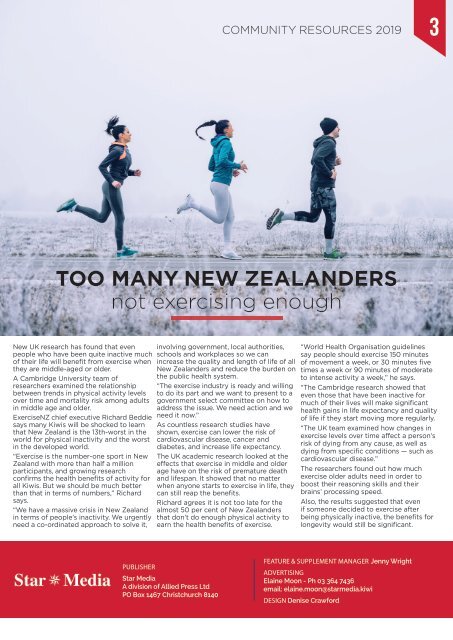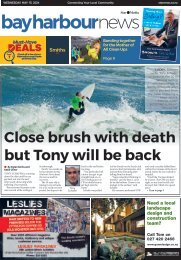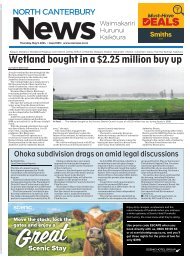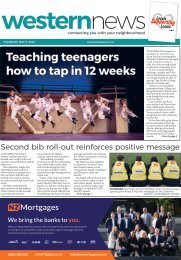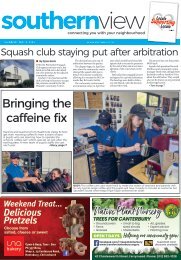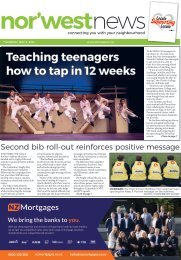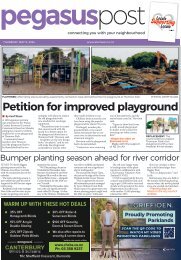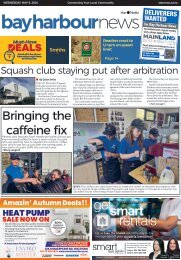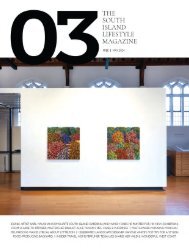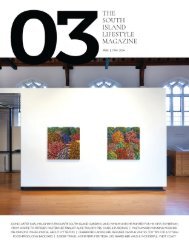Community Resources: July 25, 2019
You also want an ePaper? Increase the reach of your titles
YUMPU automatically turns print PDFs into web optimized ePapers that Google loves.
COMMUNITY RESOURCES <strong>2019</strong><br />
3<br />
TOO MANY NEW ZEALANDERS<br />
not exercising enough<br />
New UK research has found that even<br />
people who have been quite inactive much<br />
of their life will benefit from exercise when<br />
they are middle-aged or older.<br />
A Cambridge University team of<br />
researchers examined the relationship<br />
between trends in physical activity levels<br />
over time and mortality risk among adults<br />
in middle age and older.<br />
ExerciseNZ chief executive Richard Beddie<br />
says many Kiwis will be shocked to learn<br />
that New Zealand is the 13th-worst in the<br />
world for physical inactivity and the worst<br />
in the developed world.<br />
“Exercise is the number-one sport in New<br />
Zealand with more than half a million<br />
participants, and growing research<br />
confirms the health benefits of activity for<br />
all Kiwis. But we should be much better<br />
than that in terms of numbers,” Richard<br />
says.<br />
“We have a massive crisis in New Zealand<br />
in terms of people’s inactivity. We urgently<br />
need a co-ordinated approach to solve it,<br />
involving government, local authorities,<br />
schools and workplaces so we can<br />
increase the quality and length of life of all<br />
New Zealanders and reduce the burden on<br />
the public health system.<br />
“The exercise industry is ready and willing<br />
to do its part and we want to present to a<br />
government select committee on how to<br />
address the issue. We need action and we<br />
need it now.”<br />
As countless research studies have<br />
shown, exercise can lower the risk of<br />
cardiovascular disease, cancer and<br />
diabetes, and increase life expectancy.<br />
The UK academic research looked at the<br />
effects that exercise in middle and older<br />
age have on the risk of premature death<br />
and lifespan. It showed that no matter<br />
when anyone starts to exercise in life, they<br />
can still reap the benefits.<br />
Richard agrees it is not too late for the<br />
almost 50 per cent of New Zealanders<br />
that don’t do enough physical activity to<br />
earn the health benefits of exercise.<br />
“World Health Organisation guidelines<br />
say people should exercise 150 minutes<br />
of movement a week, or 30 minutes five<br />
times a week or 90 minutes of moderate<br />
to intense activity a week,” he says.<br />
“The Cambridge research showed that<br />
even those that have been inactive for<br />
much of their lives will make significant<br />
health gains in life expectancy and quality<br />
of life if they start moving more regularly.<br />
“The UK team examined how changes in<br />
exercise levels over time affect a person’s<br />
risk of dying from any cause, as well as<br />
dying from specific conditions — such as<br />
cardiovascular disease.”<br />
The researchers found out how much<br />
exercise older adults need in order to<br />
boost their reasoning skills and their<br />
brains’ processing speed.<br />
Also, the results suggested that even<br />
if someone decided to exercise after<br />
being physically inactive, the benefits for<br />
longevity would still be significant.<br />
PUBLISHER<br />
Star Media<br />
A division of Allied Press Ltd<br />
PO Box 1467 Christchurch 8140<br />
FEATURE & SUPPLEMENT MANAGER Jenny Wright<br />
ADVERTISING<br />
Elaine Moon - Ph 03 364 7436<br />
email: elaine.moon@starmedia.kiwi<br />
DESIGN Denise Crawford


